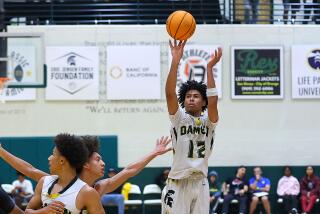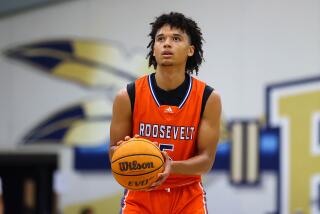Summer School for These Players Is a Course in Basketball
If a high school basketball player has the stamina and the inclination, he can participate in more organized games during six weeks in the summer than he can with a prep team during the nearly three-month regular season.
During June and July, when baseball is supposedly king, high school players can compete in prep leagues, tournaments and instructional camps. The best players are invited to elite camps to participate against other outstanding players from around the country.
Westchester High, which won the championship of the Los Angeles Watts Summer Games on June 30, played 30 games last season when it won the Los Angeles City 4-A Division title and advanced to the Southern California regional tournament.
Westchester Coach Ed Azzam said the Comets will play approximately 20 tournament games this summer. The number would be greater if Westchester were involved in a summer league, as it has been in the past.
But several of Azzam’s players will be involved in games on their own at all-star camps and tournaments. In a weeklong all-star camp, players are involved in as many as three games a day.
Prep coaches whose teams play together for about six weeks during the summer use that time to evaluate players for the upcoming season and teach their systems to varsity newcomers.
Players also learn how to improve their games and hope to impress a scout or coach to increase their chances of earning college scholarships.
But according to prep coaches from the Westside, South Bay and San Gabriel Valley, some players may pick up bad habits in the summer.
Azzam said that “summer is a time for individual improvement in the off-season and (for players) to work on their skills, to play and have a good time.”
But summer basketball can get “a little bit out of hand,” he said, especially if players believe they have to excel at several camps and tournaments in order to improve their chances of earning a college scholarship.
“A lot of times kids get involved with all-star teams and think they have to win every game, have to perform to win a scholarship,” Azzam said. “And that’s just total bull. That’s just not true.
“There are so many coaches and scouting services that they will find the players, instead of the other way around. If you’re good, you’ll be seen at a ton of games in July. Coaches are out (scouting) all the time, and very seldom does a player go unnoticed if he is talented.”
St. Bernard Coach Jim McClune, who also serves as the school’s athletic director, said he is often concerned about a player’s burning out in the summer.
But McClune, who worked as an academic counselor for some of the nation’s best players at the annual one-week Nike camp in Indianapolis July 5-9, doesn’t think a player will wear himself out in St. Bernard’s six-week program, which this summer will involve about 15 games. A camp or tournament or two shouldn’t be a strain for most, he said.
“For most of them it’s fun, exercise and good, clean athletics,” he said.
McClune said each of his players is permitted to take a week off from the high school program to attend a “showcase camp.” But it sometimes happens that an athlete will take more than a week off for camps and lie about why he is doing so.
“Some kids have coaches (in all-star programs) who are very antagonistic to the high school program,” McClune said. “The kids feel they have to lie to (their high school coaches. They) say they have to visit their grandmothers” when they are instead playing for an all-star team.
McClune said he doesn’t blame an athlete who chooses a “showcase” camp over a high school program because college recruiters are only allowed so much time for visiting camps.
NCAA restrictions on recruiting times give scouts “very narrow windows to evaluate . . . kids,” he said. But such limitations, he added, “cut recruiting costs” because the scouts can do much of their visiting at camps instead of traveling all over the nation to players’ hometowns and schools.
Azzam understands the problems of summer recruiting, but he says the NCAA could solve them by eliminating the summer scouting visits as well as the early signing period in the fall. In that way, he said, recruiting would focus again on the regular season.
“Kids should be recruited through the high school,” Azzam said. “In most cases, a high school coach is a better judge (than a coach of a summer all-star team) of what a kid can do on the court and academically. Some (all-star) coaches are in it for ulterior motives, to make money and to use these kids in order to do that.”
Fairfax High Coach Harvey Kitani agrees that too much emphasis is placed on all-star programs as the places to be seen by college scouts.
Kitani said recruiters have “found kids in other countries, not playing in (an all-star tournament). College people will come out; it doesn’t matter whether you play for John Smith High School in some small state if you’re any kind of player.”
Glendora High Athletic Director and boys’ basketball Coach Mike LeDuc said the individuals who run camps or tournaments solely as moneymaking enterprises or skirt the rules of recruiting are “a disgrace.”
“There are a number of people who run good programs,” LeDuc said. As for the others, “I am appalled by them and would love to put them out of business.”
Some athletes may give phony excuses when they can’t make some of the games in their high school program, but others have legitimate reasons for being absent.
Summer jobs and vacation trips sometimes keep athletes from playing with their high school teams and prep coaches will usually excuse the youths in such cases.
If a player misses significant time from his prep team’s program, however, he may find that other players have moved ahead of him for a place in the starting lineup.
Kitani said that if an athlete needs a job, vacations with his family or misses a week of the high school games to attend a camp, “it won’t count against him.”
“But players have to understand that these games are for them, for the experience of an individual and for team competition,” Kitani said. “And if they’re not (at the prep team’s games), they’re not going to get better.”
LeDuc said he would not penalize one of his players for devoting more time to all-star programs than to the Glendora program, but if a player spends too much time away from the prep program, he would have to realize “chances are somebody else is getting better and he is letting others get ahead of him.”
Kitani said players sometimes don’t receive the discipline they need in all-star programs.
“I’ve always been a supporter of the idea that kids need to play as much as possible, but I’ve seen in the last 10 years that discipline is not up to what I think it should be,” he said.
He said some all-star coaches are more interested in assembling talented teams than in making players work on improving their games.
Muir High Coach Bill (Rocky) Moore said players should first think of their high school program because that is where they will find the help they need to improve.
“Kids need to prioritize,” Moore said. “If a kid makes a commitment to a (high school) basketball program, he becomes a member of a basketball family.”
Moore said if one of his players gets a scholarship to attend one of the showcase programs, he would encourage the player to go.
But if one of his players had to choose between playing mostly for all-star teams or for Muir during the summer, “I would encourage him to play with me,” he said.
More to Read
Go beyond the scoreboard
Get the latest on L.A.'s teams in the daily Sports Report newsletter.
You may occasionally receive promotional content from the Los Angeles Times.










